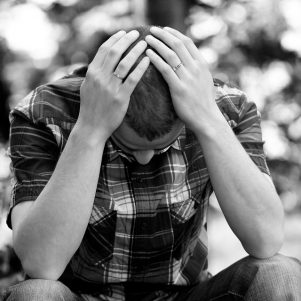Must we live in stress?
Article By Ilanit Adar
 Every period in life as in the life of a society as a whole, can be characterized through different aspects: social, economic, scientific, educational and others. Every period is different from the previous one and from the following one, because everything changes with time…
Every period in life as in the life of a society as a whole, can be characterized through different aspects: social, economic, scientific, educational and others. Every period is different from the previous one and from the following one, because everything changes with time…
If we consider the social-psychological perspective of the actual period, we can say that one of its characteristics is STRESS. This is not the momentary natural tension that appears when we face new situations or when making decisions, nor is it the excitement felt before a significant and important event or a big project. This is a long lasting inner state of pressure that causes an imbalance, an almost constant state of life.
The word ‘stress’ as a description of a state of mind originated in the 1930’s by Hans Selye, a doctor of Austro-Hungarian origin. Up until then the word was only used in the field of physics, in order to describe the external force exerted on matter, causing movement as result. This demonstrates that the experience of psychological stress is a relatively new phenomenon, a result of a certain lifestyle.
It seems that in recent years, the man of the era of smartphones, tablets, and the countless gadgets and applications, is on a super-fast racetrack, which starting point he does not recall nor is its aim always clear, because its possible that the track may be circular. In any case, it seems that the acceleration of technology has been a significant factor in the acceleration of inner tension, and the feeling that one must run forward and close a certain gap, imaginary or not.
Let us look at what transpired before the technological era. On one hand there was more simplicity in the everyday conduct of the individual. The proximity to nature and the cultivation of land forced the individual to engage in a limited number of actions that were often repetitive. This simplicity surely influenced the way of thinking and the natural and harmonic connection with the environment. On the other hand the individual worked harder. Great effort and energy was required to work in manual jobs, move things, get around on foot or convey messages from place to place. The time needed to perform these operations was long as well.
With the gradual entry of technology, it seems that almost every human action had found a replacement in the form of a device or a machine. The different domestic appliances can help shorten the time in which we deal with housework, using vehicles we can cross through countries within a few hours, and with social media messages we can convey information we need to deliver quickly.
Today we can say that the physical effort required to operate most of these activities is small, and often comes down to a touch of a button. If we had imagined this situation tens or hundreds of years ago, we would think it would bring a situation with more convenience, efficiency, tranquility, serenity and happiness, since there is no need to tire or strain too much to get a particular thing, and you can have time to do the truly important things in Life …
But is that the case? Have the solutions we invented indeed advanced the human being?
It is great that technology added a lot of convenience and efficiency in the basic levels of our existence but can we really say that with these technological developments Life has become more peaceful? less stressful? or that the individual has more time and availability, being less busy and preoccupied?
And where is the happiness that some companies continually promise us when we buy one of their new products?
If we isolate a certain device or product, we will find many advantages for making our lives simpler and more comfortable, as well as great satisfaction, which is the result of its immediate benefit.
The satisfaction, for example, of sending an e-mail to make things happen, or the satisfaction of receiving a product or some information by a push of a button, something that would have taken us months to look for without the Internet. But if we look at the whole and possibly deeper picture, which lasts beyond the momentary pleasure, which penetrates the inner effects of this technology, we see a situation that must be addressed.
It seems that the penetration of devices into our lives and their use is not the problem in itself, since the purpose is often good. The principal problem is the new types of perceptions or ways of thought as well as new lifestyles that perhaps without realizing have entered into our lives together with technology. These perceptions can be dangerous, like everything else that is out of balance.
Lets Consider some of these perceptions that we have assimilated in recent years: One of the most popular modern perceptions is speed and the necessity of constant innovation. The upgrading pace of the various devices has increased and, with it, the need to constantly renew and replace the product. It is common today to replace cellphones every year or two and a laptop every two or three.
Ostensibly, this seems positive because if it is possible to make a better device in terms of technology so why not upgrade it?
But what is the price that we have to pay? The rapid production rate and the need to keep up with it and not to be left behind has penetrated our lives and is expressed in various forms such as: thinking quickly, reacting quickly, acting quickly in order to solve problems faster and so on.
The experience of living life as a race has penetrated us to the point where perhaps we have lost some of that ancient wisdom that relates to understanding life, and to the fact that sometimes a process can take time, just like a seed that requires time and the appropriate conditions in order to become a tree.
Another common concept is that we have no time. Man is usually very busy.
In general, to be busy and active is a good thing and indicates a type of health and vitality, but the problem is when a person uses the word ‘busy’, he is in fact meaning to say ‘preoccupied’.
To be preoccupied is to be concerned, it is a situation in which even if you have physical time, the mental or emotional preoccupation causes the illusion that you do not have it. If you could give plants or animals the opportunity to express themselves would they also complain about the lack of time to fulfill their duties? And perhaps in the same manner, if the individual first and foremost sets his goal to become a human being, then he will always have time, since there is no limit to the possibility of expressing human virtues such as beauty, patience, attentiveness and generosity.
Another modern concept, no less popular than its predecessors, is that the more a person consumes, the happier he will be. Technological progress along with the prevailing economic system – capitalism – engendered a great illusion: man always lacks something in order to be happy. Therefore, to fill the void one must always purchase the newest product, encouraging companies to produce more and newer products. In the framework of this vicious cycle, a question appears: when will a person have everything he needs? Perhaps we need to seek this feeling of fullfilment elsewhere? Perhaps breaking the rules of the game will accelerate the need to seek individual and stable happiness within oneself?
The previous conception brings with it the notion that one has to be the best. After all, if one wants to be able to purchase more one must earn more, to improve one’s social status and climb up the social ladder. But does being the best require us to be the most ethical and moral? If this were the case, we would now be living in a moral and ethical society with principles of integrity and truth. Today, in order to be better, the individual needs to enter a competitive race against the friends with whom he works. In many cases the motor for this kind of action will be fear of failure or staying behind.
In light of the above, one can see easily how modern man is sucked into a situation of daily stress that affects the different aspects of his life.
How can we change this?
If stress is a state of imbalance, the answer lies in restoring balance and harmony. This does not mean that we should ignore the developments of recent years, to give up the progress and go back to the Stone Age or Iron Age, but to relearn the difference between ends and means, and to revive the principles and wisdom we have somewhat lost.
For example, one of the basic laws of nature is the law of order and harmony. In Nature things are well organized, everything has its place and knows its duty: From the plants and animals, through mountains and seas, to the sky and the stars. There is harmony, correct relations, mutual respect, a melody that creates life. Man is an additional life form, which is part of the whole fabric. How, then, must he act to contribute to harmony and not to violate it?
In the Repository of human wisdom as reflected in the literature of different cultures (the Indian Mahabharata, the Analects of Confucius, The Buddhist Dhanmapada and many others), can be found a principle of life which is the ‘Middle Path’. The Middle Path guides a person to maintain inner balance within the movement that life brings with it, how to live without falling into one of the extremes of more or less, spiritual or material, indulgence or abstinence.
Contemporary reality can also obey the law of the Middle Path, If we take into account a few things:
•To note misconceptions that penetrate into our lives, and know how to neutralize them through good education.
•To remember and educate that no tool or device can provide the profound happiness which we long for. At the same time strive to find the inner joy that is not dependent on anything.
•To develop, but not only technologically, also in terms of values and morality.
•To dare to control weaknesses, to put limits and know when to use and when not to use a certain device or tool.
•To learn about creativity and initiative not only in order to think about the latest product, but to break mental concepts that have accumulated and to build healthier ones.
The Middle Path is the intelligent action that does not ignore the moral aspect of the action, and looks for ways to address not only the basic needs of man, but also his natural yearning to grow toward the good, the beautiful, the just and true.
Is the Middle Path the answer to life without stress? Yes and no. If by ‘stress’ you mean the unhealthy stress that arises from an incorrect way of life that has infiltrated our lives, then the answer is yes. By removing misconceptions and education for more correct concepts, it is possible. But if the intent of the word ‘stress’ is the right tension that keeps a human being alive and alert, similar to the correct tension that permits a string to produce a sound, then the answer is no. Since the correct tension is itself a reflection of the Middle Path.
Image Credits: By sander van der Wel | Flickr | CC BY-SA 2.0
The entity posting this article assumes the responsibility that images used in this article have the requisite permissionsImage References
By sander van der Wel | Flickr | CC BY-SA 2.0
Permissions required for the publishing of this article have been obtained




What do you think?